This post may contain affiliate links. Please read our disclosure policy.
Zaatar Manakeesh is a Mediterranean flatbread that is made with a simple dough recipe and topped with an olive-oil based zaatar spread. You’ve probably tried this at Lebanese restaurants, Mediterranean bakeries or if you’re lucky, from a relative’s kitchen! This zaatar bread is truly delicious!
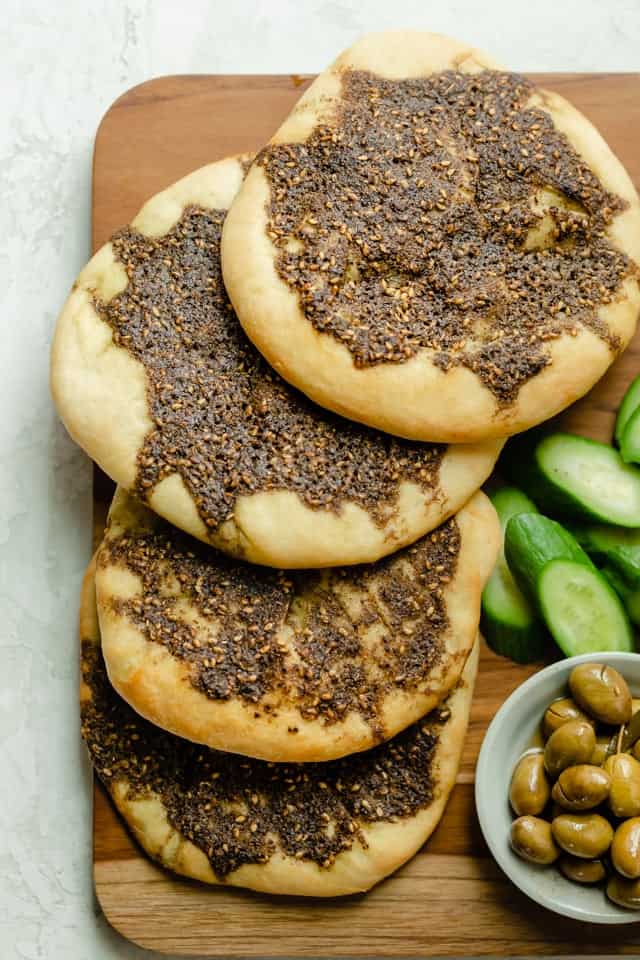
While it’s often as cheap at $1 to buy one pie, I love the smell of freshly baked manakeesh from my own oven in the mornings. And I don’t live by any bakeries that make it unfortunately. So, if you’ve ever thought it was difficult to make, I’m about to show you how easy it is!
What is zaatar
Zaatar is a middle eastern spice blend that’s primarily made with sumac, thyme and sesame seeds. This is essentially what Lebanese zaatar is composed of, which is what I’m mostly familiar with.
In other regions in the Middle East, zaatar spice blends also include cumin, oregano and marjoram. While you can make zaatar on your own, I’ve actually never made it because it’s easy to find it in Middle Eastern stores or health stores like Whole Foods or Sprouts. And I’m lucky to get it from my family in Lebanon.
What is manakeesh
Manakeesh (also known as manakish, manaeesh and manaqish; or manousheh in singular) is a Middle Eastern flatbread that is often served for breakfast or lunch. There are three popular types of manakish: this zaatar manakeesh that I’m sharing below, cheese manakeesh and lamb manakeesh. They’re are all essentially the same base flatbread recipe but with different toppings.
To make manakeesh, you’ll make dough similar to flatbread or pizza dough. Then you’ll make smaller round pieces of bread that you’ll press with your fingertips to make small dips in the dough for the topping of choice. The most popular of these Lebanese flatbreads is the zaatar bread. Just like pizza, you can slice or fold them when you eat.
Ingredients
- Yeast: Use instant yeast to start to create the dough for a light and spongy texture. We activate it in warm water and add a little salt and sugar. You can use a temperature controlled kettle to get you the right temp, or warm in the microwave for just a few seconds.
- Flour: Use all-purpose flour for the best results. If you have a gluten intolerance, you can use a 1:1 GF flour.
- Oil: Oil helps to add moisture to the dough as well as being used in the zaatar spread. Olive oil is first choice, but a vegetable oil will work well.
- Zaatar: The bread dough is spread with a mix of zaatar and olive oil for one delicious bite.
How to make zaatar manakeesh
Making the dough
Start by activating the yeast with warm water. Give it about 10 minutes and you’ll notice the yeast slowly dissolving into the warm water to become integrated. Then add salt and sugar, mix and wait a few minutes.
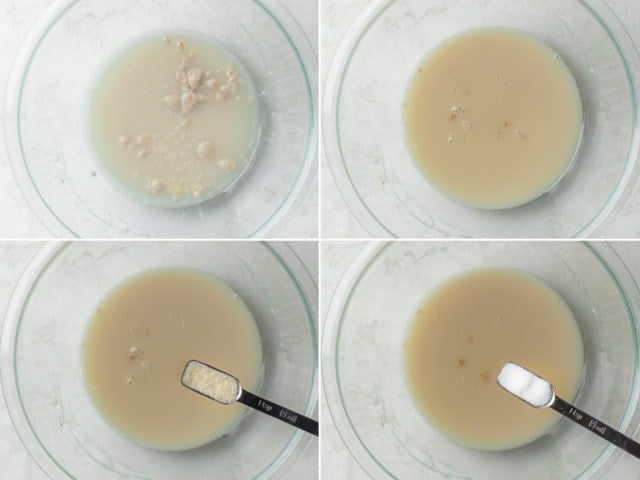
Next you’ll add olive oil and mix to combine. You’ll notice some beads of olive oil, but that’s completely normal. Now you’re ready to add the flour. Mix it in the bowl until it becomes shaggy and you can’t mix with a wooden spoon anymore.
Then transfer to a flat floured surface and knead with your hands. This step will take a few minutes, but it’s honestly so therapeutic that I don’t mind it one bit. You’re looking for a smooth surface dough ball with as little bumps as possible.
Finally, return the dough to the same bowl you used to mix the ingredients and add a little olive oil. Now’s the waiting part. Cover the dough with a plastic wrap or towel to allow it to rise.
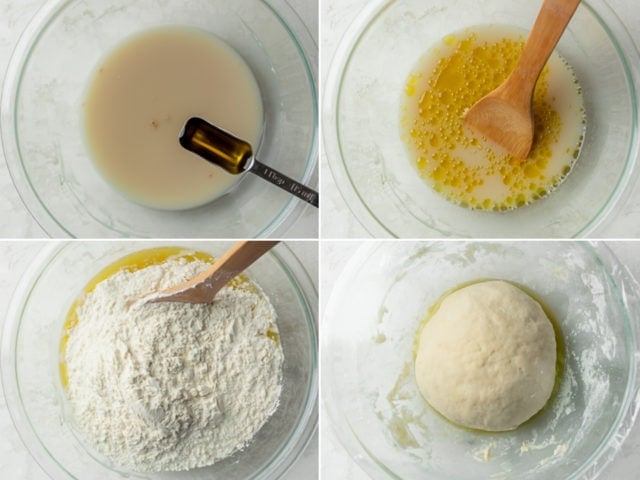
It will triple in size after 45-60 minutes. And that’s when you’re officially ready to make zaatar manakeesh.
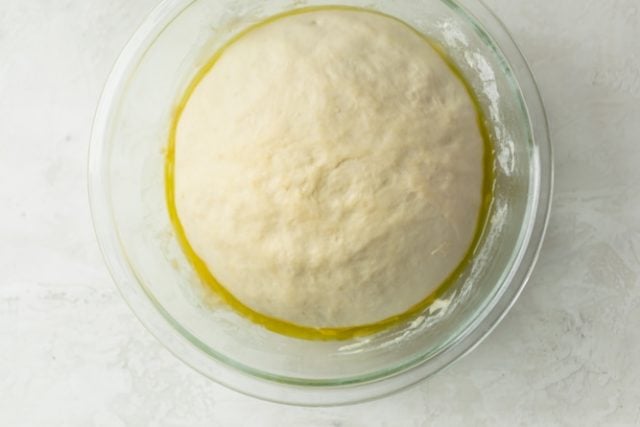
Making the zaatar spread
This is the easiest step of making zaatar manakeesh and only requires two ingredients: zaatar spice and extra virgin olive oil. You want to mix the two ingredients in a bowl until they form a spread similar to the consistency of pesto.
You don’t want too much olive oil because then the spread will leak while baking. And you don’t want too much zaatar where it looks like a paste because the taste becomes overpowering for the amount of flatbread it’s spread on. A good ratio I found for a pound of dough is about ⅓ cup of zaatar to ¼ cup olive oil. You can also start pouring olive oil slowly over the zaatar, and find the consistency that works for you.
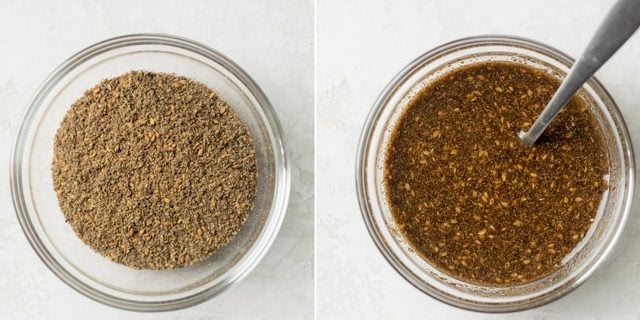
Assembling and baking the manakeesh
When the dough rises, you will to divide it into 6-8 equal parts. This makes large single serve portions that you can eat as a whole meal for breakfast or lunch. If you prefer to make smaller manakish to serve as an appetizer, you can even cut the dough into 12 equal parts. I think it’s much faster to make larger ones, and you can always use a pizza cutter to cut each one into triangle slices.
Then you’ll spread the zaatar mix on the round small flatbread. Spread in a circular motion evenly throughout the center of the dough, leaving the edges dry.
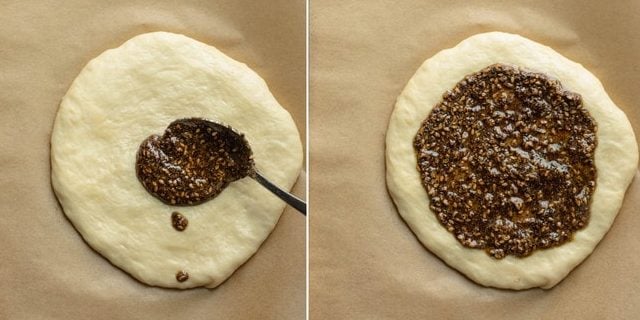
Bake them in a preheated oven until they’re lightly golden on the edges and underneath. They will puff up and spread slightly while baking in the oven. The result is a chewy and crisp zaatar bread that is full of warm spices and amazing flavor.
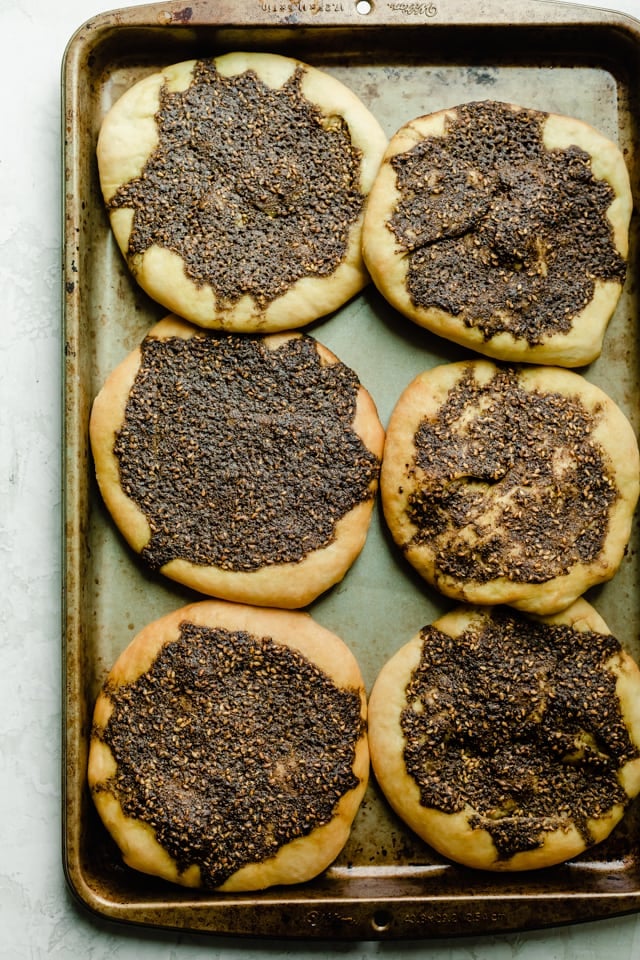
Tips To Make This Recipe
- Use an instant yeast to make this zaatar bread quickly. Active yeast can also be used but it will take a little bit longer to activate.
- Don’t skip the rising time. The beauty of these flat breads is their light and fluffy texture. If you make them to soon, they will be tougher and chewier in texture.
- Bake in a preheated oven. This allows them to cook evenly through. If you put them in a cold oven, the outsides will be cooked before the middles.
- Enjoy them plain. These zaatar manakeesh are so delicious with the spread, but you can easily enjoy them plain if you prefer.
Frequently Asked Questions
Once cooled, place your zaatar manakeesh in an airtight contianer or wrap. They will keep at room temperature for 2 to 3 days, or up to a week in the fridge.
You can freeze these once they are baked and cooled and will keep well for up to 3 months. You can thaw them in the fridge to reheat, or reheat in the oven from frozen at 350F til warmed through.
Now that you have these delicious golden crusted zaatar bread, how should you serve them? Typically, you’ll want to eat them for breakfast or brunch along with cheese like halloumi, akawi and especially labneh. We enjoy it as part of a savory warm breakfast with lots of fresh vegetables like tomatoes, cucumbers, green onions and olives, along with cheese and arabic tea.
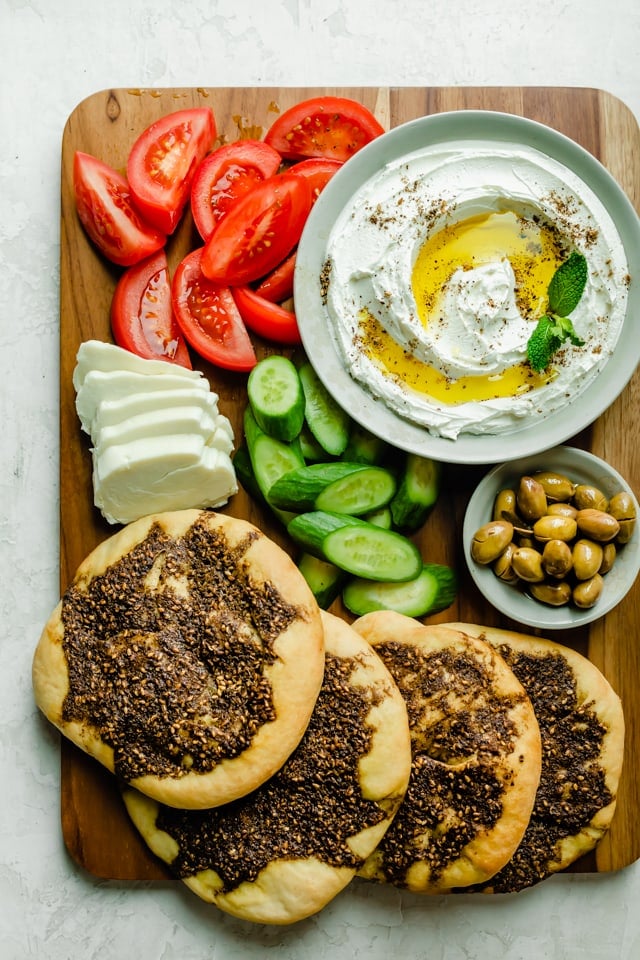
There really is nothing like some freshly baked manakeesh, and the zaatar spread really does wonders. Simple to make and so yummy!
For more mediterranean brunch recipes:
I love the simplicity, authenticity and deliciousness of this zaatar manakeesh recipe. If you’re not fortunate to live next to Middle Eastern bakeries that churn out hundreds of these a day, you can still enjoy them with my homemade zaatar bread recipe. It’s so easy to make the dough from scratch and the reward of having warm savory manakeesh for breakfast is so worth it!
If you’ve tried this healthy-ish feel good Zaatar Manakeesh recipe or any other recipe on FeelGoodFoodie, then don’t forget to rate the recipe and leave me a comment below! I would love to hear about your experience making it. And if you snapped some shots of it, share it with me on Instagram so I can repost on my stories!

preorder MY book
The Feel Good Foodie Cookbook is now available everywhere books are sold!
Amazon Barnes & Noble Books A Million Hudson Booksellers BookshopSCHULER Books (SIGNED)
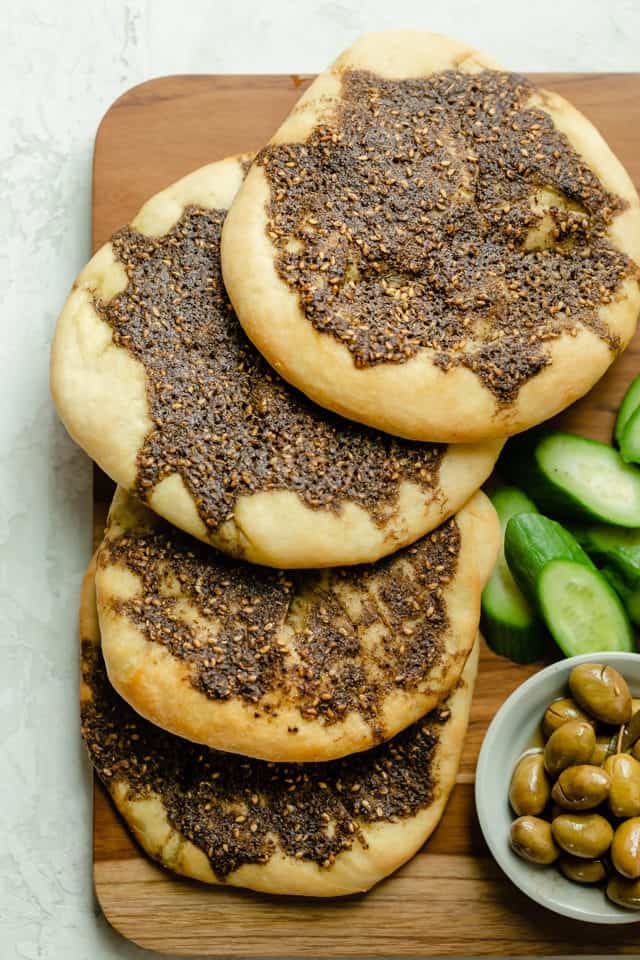
Zaatar Manakeesh
Video
Ingredients
Dough
- 1 tablespoon instant yeast
- 1 cup warm water
- 1 teaspoon salt
- 1 teaspoon granulated sugar
- 3 cups all-purpose flour plus more for shaping
- 2 tablespoons olive oil plus more for coating bowl
Instructions
Make the Dough
- In a large bowl, activate the yeast in warm water; allow 10 minutes for it to proof.
- Add the salt, sugar and olive oil to bowl and use a wooden spoon to mix until combined. Wait a few minutes, then add the flour into the wet ingredients and mix with a spoon until the dough becomes shaggy and you’re no longer able to mix.
- Transfer to a floured surface and knead the dough by hand to form a tight ball.
- Place the dough back into the same oil-coated bowl. Cover with a plastic wrap or towel and set aside at room temperature to rise for 45-60 minutes.
Make the Zaatar Spread
- Mix the zaatar with olive oil in small bowl until it forms a consistent and spreadable mixture.
Assemble and Bake
- Preheat the oven to 450° F and line a baking sheet with parchment paper.
- Divide the dough into 6-8 equal parts, depending on how large you’d like them. Use your fingers to spread each piece into a round flat disc, about ¼ inch thickness.
- Place 1-2 tablespoons of zaatar spread on each dough and use the back of the spoon to spread evenly. Place on the prepared baking sheet.
- Bake in the preheated oven for 10-12 minutes, until the dough becomes light golden in color and puffs slightly.
- Enjoy warm with cheese and vegetables, if desired.
Notes
Nutrition
Nutrition information provided is an estimate. It will vary based on cooking method and specific ingredients used.
Hello! I was just wondering if I’m able to use self rising flour in place of the all purpose. Will the extra ingredients in self rising flour hurt the recipe?
Yes, I’m afraid it may be overleavened.
Followed the recipe to a T and it turned out perfect! My partner loves having it every morning during suhour. Thank you, Yumna!
Thanks so much!
Is there a commercial dough that can be used? I have used Pillsbury French loaf but it is no longer available.
You could try using a store bought pizza dough, but for best results I would suggest making the dough from scratch. It comes together quite quickly!
Hello! Thank you for sharing this recipe. I’m really excited to try it this weekend! I usually use a microwave in convection mode for baking. Would this recipe work as is or is there something I should alter? Any advice would be gladly appreciated. Thank you!!
That should work out well, just be sure to reduce the oven temperture by 25˚F to account for the convection.
Thanks so much! Can’t wait to try this!!
would love to make these! i’m wondering if you can tell me the weight of the flour in grams? i don’t use cups to measure anymore because i never get an accurate measurement.
Unfortunately, I don’t test my recipes in weighted measurements, I totally understand your preference, but this is how I call for ingredients here. I’m sorry for the inconvenience
Love your recipes ! I am wondering if I can use the mixer to make this dough ?
Yes, that shouldn’t be a problem! I’d mix the dough initially with the paddle, then once you have a shaggy dough, switch to the dough hook and knead with that until smooth.
Thank you !
Hi Yumna, I just want to double check , you mentioned having the dough disk half inch in thickness ? Is this correct or is it half centimeter that you meant ? I just imagine half inch is too thick ..please correct me if I’m wrong.
Hi Eddy, that is a typo, it should be 1/4 inch thick! Thank you for pointing that out, I fixed it in the recipe!
Hi Yumma, thank you for your recipe, it reminds me of my country. I have not tried it yet as I need to gather the ingredients as I live in England and cannot get a decent Mankoushy.
I value our kind of food more than ever as we took it for granted back home. I shall visit your recipes and see what I can cook as our recipes are all so healthy and made out of scratch, I am glad I found your site.
Can I use wolemeal flour? how much can I use for the three cups stated in your recipe?
Hi Gabrielle! So nice to have you on my site! Yes, you can use wholemeal flour at a 1:1 ratio from what Google says. I’ve never made this recipe with wholemeal flour so I am nots sure how it will turn out exactly, so you might need to experiment with it a little. Hope you enjoy!
I love so many of your recipes! You are an amazing cook. My family and I are gluten free. Do you have any recommendations for making Za’tar Manakeesh with GF flour?
In general, I wish you would add comments about GF alternatives. Thanks
Hi Kitana, thank you so much! It’s hard for me to comment on the use of GF flour without testing the recipe with it, and I don’t want to lead anyone down the wrong path or waste ingredients. I have not made this recipe with GF flour – so I am not sure how it will turn out. You can test it, though. If you do, make sure you come back and let me know!
I’m definitely going to try this recipe! What kind of cheese and dip do you serve it with? The picture shows a type of cheese and dip. Looks delicious!
Hi Corinne! It’s Labneh, and you can find the recipe here: https://feelgoodfoodie.net/recipe/labneh/. You’ll have to let me know what you think after you make it! Hope you enjoy!
Where do you purchase zaatar? I live in Ontario, Canada
Hi Loretta! If you have a Middle Eastern market near you, that is the best place to look. If not, you can get some off of Amazon. This is the one I’d recommend: https://amzn.to/3JUlwDG
What am I missing from reading this recipe…I can’t see where it says the about of flour and yesterday….
The full recipe is at the bottom of the page! Let me know if you can’t locate it.
Just made this and it is absolutely amazing! What a great recipe. Any tips for reheating if I store the leftovers in the fridge?
Yay!! I love that. Store any leftovers in an airtight container, and it will last about 7-10 days in the fridge.
Thanks! So you eat it cold rather than reheating?
I would reheat it in the oven at 350°F for 3-6 minutes – just be sure to keep your eye on it!
Just made these, I think they were a little bit too “doughy” for me with the stated bake, perhaps will try reducing the flour next time.
Otherwise, it’s a great quick recipe! Thanks for sharing.
You can definitely adjust to your liking! Thank you!!
This recipe is delicious, versatile, and easy to make (I made it 3/4″ thick and it turned out well).
Thank you! That’s great to hear!
Hiya! I just made this recipe after my neighbor gave me zatar from her country. They came out delicious but the biggest problem is your recipe says to spread to inch and half thickness but that would be very thick and the video you spread it thin. Next time I will make thinner.
Zaatar is the best! I’m so glad you enjoyed them. Definitely play around with the thickness to fit your liking!
I made this recipe and it was so delicious!!
Do you have any tips if I wanted to make this recipe with akawi cheese (Cheese Manakeesh)?
Thank you so much! I have yet to make it at home!
Can I make this in whole wheat flour please
Yup that works!
Hello!
I would like to make a gluten-free version with Bob Mill’s 1 to 1 Baking Flour – what would be the measurement replacement for this? Thank you!
Hi! I haven’t tried it with a gluten-free flour, but if the package says that it can be used in place of all-purpose flour in a 1:1 ratio, you can stick to the recipe!
Hello! Here in Australia they serve the manakeesh very thin – could I use the same recipe but roll them out larger to achieve the thinness? In which case, how would the cooking time change?
You most definitely could! I haven’t tried it, so I’m not exactly sure what the cooking time will be, but I’m guessing it’ll be around 8-10 minutes depending on the thinness.
Made this ,as my husband worked in the Middle East and we lived in Kuwait for a few years. He loves Zaatar and I made hummus too, was gorgeous.
So glad you loved it! Thank you!
Hi,
It’s always a challenge finding a good zaatar mix – where do you recommend to buy some online if I’m not close to a Middle Eastern store?
Thanks!
I’ve never bought any online since there are Middle Eastern stores by me. But I think this is a reputable site with a Lebanese mix, which is what i use:
https://www.olivenation.com/spices-condiments/rubs-seasonings.html
Awesome, thank you!
I live very close to Mediterranean store and they do sell Zaatar bread but sometimes I end up having bunch of left over thick pita bread. Can I use ready to eat pita bread and add Zaatar and olive oil and bake it for few minutes to make Zaatar bread?
Oh yes, that will definitely work!
Bonjour, je voulais juste te dire que t’es recettes sont vraiment sympa et simple à faire !! Hâte de réaliser cette recette !! Boussa kabira min Franca !! ?
Merci!
So you didn’t knead it after it finished rising?
No, there’s no need to knead after it finishes rising.
Only asking as a chef on YouTube did to remove any bubbles caused by the yeast
Ohhh interesting! It might be helpful then, but I’ve never done it.
What kind of cheese is the sliced white cheese on the tray?
That’s halloumi 🙂
If I don’t have time or energy to make the dough from scratch, do you have any shortcuts for a busy mom of three little ones that you recommend? My Lebanese mom uses Greek pita bread for these, but I don’t love that option. Would store-bought pizza dough work?
Sure thing, you can use store-bought pizza dough or the thick naan bread works great for this recipe too!
My dough turned hard… And it didnt rise
Oh, I’m so sorry to hear that. Did you change any ingredients or change any steps?
Such a great recipe, thank you so much
I used self raising flower instead of all purpose and it worked just as well
Oh that’s great to hear. Thank you!!
Is the white cheese in the bowl labneh with olive oil? Thanks!
And is there zaatar sprinkled on top of that bowl too? I would just like to re-create this lovely picture ☺️
Yes there is! 🙂
Yup! That’s labneh with olive oil!
I’m doing a school project and I’m looking for why this recipe pertains the lebanon like what makes it from there. I need evidence. Recipe looks great btw.
Thanks Katie. I think you might need to research more about the origins of the recipe. My site is more about how to make the recipe, so I can’t really help with the history behind the recipe.
Second time making these and they are amazing however 2 1/2 cups of flour works better
That’s great to hear! I will try out reducing the flour and see how it turns out. Thanks so much for sharing!
Made it a couple times already and they’re always a hit! Great recipe!
Thanks so much for sharing!! So glad you like it!:)
Pretty good
Thanks Sarah!
I would really feelgood if you would have explained that zaatar is arabic for thyme and manakeesh is arabic for decorated by hand.
Thank you
Hello, actually zaatar is a blend of dried thyme, sumac and sesame seeds. I don’t believe it’s just thyme. And what Arabic dialect do you speak? For us in Lebanon mzayan means decorated by hand. Manakeesh means baked flour dough. There maybe be a regional difference though in some of these words.
This recipe reminds me of filming in Beirut during the 80’s and 90’s. They are so good but needs good za’atar
Hahaha I know what you mean!!
Homemade zatar bread sounds amazing! Do you think it would work with a gluten free flour? I have a flour made from chickpeas and other assorted sources.
Hi Vivian – Unfortunately I haven’t tried it with gluten free flour since I don’t usually bake with it. But let me know if you try it and how it turns out! I think the measurements would need to be adjusted for sure.